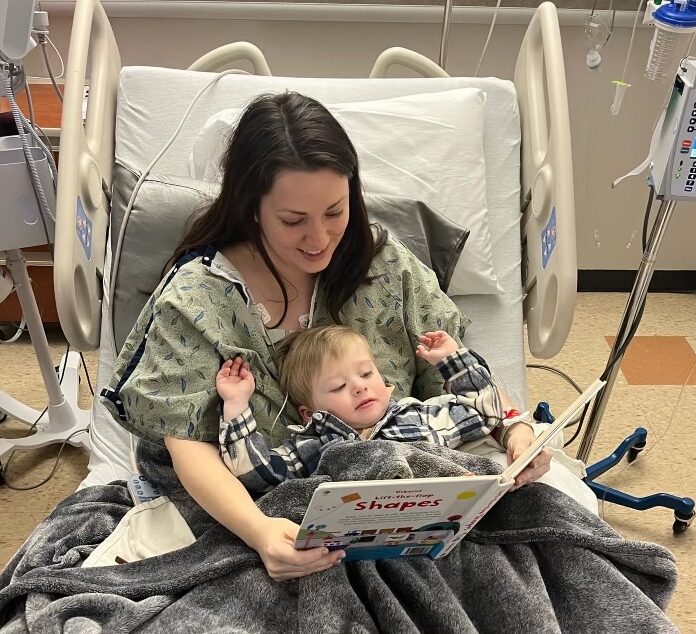
My Journey:
You're Never Too Young to Protect Your Family

Written by Amber Cate
At 28, I was a typical millennial — active, health-conscious, happily raising my beautiful little boy with my husband, and enjoying a successful career. I did CrossFit multiple times a week and had just completed a half marathon. I’d never been a smoker, had no family history of disease, didn’t live near a nuclear plant of any kind…
I’d made all the “right lifestyle choices”, yet despite the false sense of security I had—I woke up in the middle of the night, gasping for breath, lightheaded from asphyxiation while desperately coughing to get blood out of my lungs. I had no idea what was happening—somehow, we made it to the emergency room where I was admitted and a CT scan revealed that I had a tumor completely blocking my right airway. What followed was a mix of shock, grief, fear, and a continued series of x-rays, scans, and a bronchoscopy that culminated in a neuroendocrine cancer diagnosis less than 24 hours later.
"Please do not wait until you’re enduring a terrible circumstance to get your plan in place, or worse, risk the chance of leaving your loved ones to wade through it in the midst of their own grief. Find the right partner today to get your estate plan set up."
While recovering from my first painful surgery, the rest of my treatment plan was established, which put another surgery to have my lung removed on the calendar—an invasive procedure which came with a substantial amount of uncertainty and risks. I knew I had to truly face this reality by setting up a will in preparation for the worst case scenario.
My Wake-Up Call
I had never intentionally decided I was not going to have a will or an estate plan in place. In fact, setting that up had been on my “I’ll-take-care-of-this-at-some-point list” along with a dozen other items.
Only 38%
of Millennials have a will or trust.
Trust & Will, 2021 Estate Planning Study
I merely saw it as something that I had time to get around to doing – my circumstances had never required me to have a sense of urgency acute enough to go and check this step off my list. Looking at available data, it’s concerning that I was not alone in my thinking. Trust & Will found only 38% of millennials have a will or a trust. I was part of the 62% living in ignorance, never stepping into action– despite having assets and people I cared about and that relied on me financially.
The Legacy You Leave Behind
Call To Action: Get Your Estate Plan In Order

Thankfully, my surgery was very successful, the tumor had not metastasized, and my thoracic surgeon was able to entirely remove it. A subsequent report showed that I have been healing well and completely cancer free since! While we are infinitely grateful that getting my will in place served as merely a precaution, I am further grateful for the peace of mind and security it offers my family moving forward.
Getting a will in place is a significant milestone– one that enables you to have confidence and freedom in the face of unexpected tragedy to spend your time and thoughts on what truly matters.
Thankfully, my surgery was very successful, the tumor had not metastasized, and my thoracic surgeon was able to entirely remove it. A subsequent report showed that I have been healing well and completely cancer free since! While we are infinitely grateful that getting my will in place served as merely a precaution, I am further grateful for the peace of mind and security it offers my family moving forward.

About the Author
Amber Cate lives in Paris, TN with her wonderful husband and their precious little boy. She holds a triple degree from Harding University and is passionate about equipping others to receive sound financial advice and guidance.

About Willow
Willow connects you with vetted financial advisors who truly understand the big moments in life—like buying a home, navigating career changes, or going through a divorce. It’s not just about finding any advisor, but about building a meaningful, long-term relationship with someone who gets your goals and challenges. Using a concierge matchmaking approach, Willow ensures you feel confident and empowered as you plan for whatever life throws your way, making financial advice feel less transactional and more like finding the right partner for your journey.


